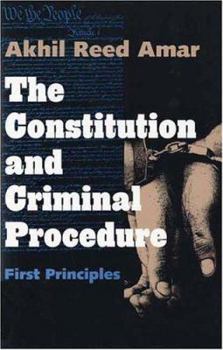The Constitution and Criminal Procedure: First Principles
Select Format
Select Condition 
Book Overview
Under the banners of the Fourth, Fifth, and Sixth Amendments, the Supreme Court has constitutionalized a vast amount of criminal procedure law in ways that often reward the guilty while hurting the... This description may be from another edition of this product.
Format:Hardcover
Language:English
ISBN:0300066783
ISBN13:9780300066784
Release Date:February 1997
Publisher:Yale University Press
Length:288 Pages
Weight:0.95 lbs.
Dimensions:0.9" x 6.4" x 9.5"
Customer Reviews
2 ratings
very informative
Published by Thriftbooks.com User , 15 years ago
Professor Amar has written a fine book in, "The Constitution and Criminal Procedure". Overly thin - the critical elements are included, but, not particularly helpful. Written 11 years ago, it's somewhat out of date. Tends to read the constitution in much more literal and original terms than most defense attorneys. Okay. I wish that it had been more comprehensive and thoughtful. I'd give this a solid B. I'd recommend reading some of the newer and more comprehensive and better researched texts.
Lays out criminal procedure for lay persons and lawyers
Published by Thriftbooks.com User , 24 years ago
Akhil Amar, a distinguished law professor at Yale University, has written a very accessible book that discusses what's wrong with criminal procedure today.Most people tend to think that the Fourth, Fifth, and Sixth Amendments protect the guilty far more than society. For example, under the Exclusionary Rule, courts must suppress evidence that is obtained unlawfully, even if the suppression results in letting criminals free. (Studies show that in reality, the percentage of cases in which criminals escape prosecution on technicalities is quite low.) Notwithstanding the cries of the ACLU and other defenders of criminal rights (such as Alan Dershowitz), most people probably think this system is crazy.Professor Amar explains why a common sense approach is in fact the best way to interpret these constitutional rights. His analysis involves both a plain reading of the language of the Amendments (a textual approach) as well as the historical understanding of these rights (a Framers' intent approach). Both ways of looking at the issue confirm his belief that the Supreme Court has made a number of wrong turns throughout the years.Lay persons will not find this book too difficult or theoretical.






